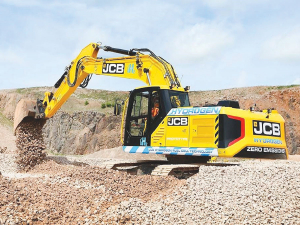While most motive industries are focused on hybrid or EV power plants, JCB has developed the construction industry’s first hydrogen-powered excavator.
The 20-tonne, 220X is powered by a hydrogen fuel cell. This works by reacting hydrogen with oxygen, to create energy to power electric motors – with the only emissions being water at the exhaust pipe.
Currently undergoing testing at JCB’s quarry proving ground, the excavator joins a list of the company’s other emission-beating technologies.
This includes its first fully electric, mini-excavator, the 19C-1E. This was recently complemented by an electric version of the JCB Teletruk telescopic forklift, the JCB 30-19E
“The development of the first hydrogen-powered excavator is very exciting as we strive towards a zero-carbon world,” JCB chairman, Lord Bamford says. “In the coming months, we will develop and refine the technology with advanced testing of the prototype machine.”
In other news, the company also appears to be leading the way with its in-house Dieselmax engines. JCB claims the latest Stage V versions have reduced emissions of nitrous oxide (NOx) by 97%, soot particulates by 98% and carbon dioxide (CO2) by close to 50%.











